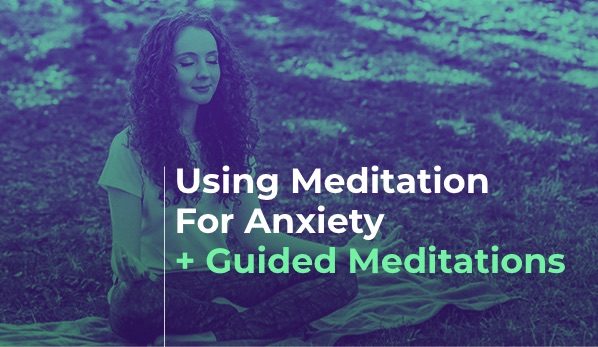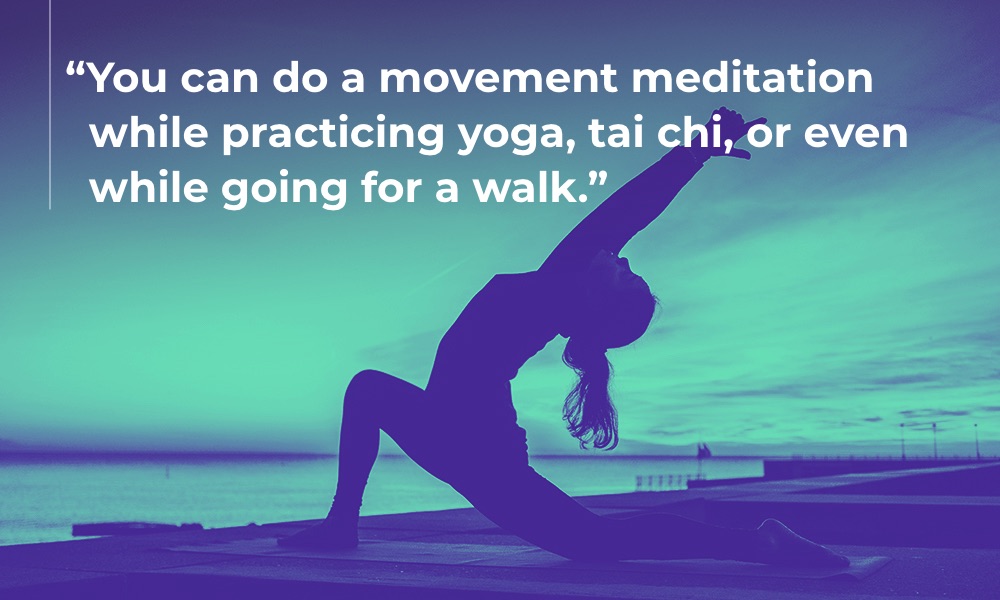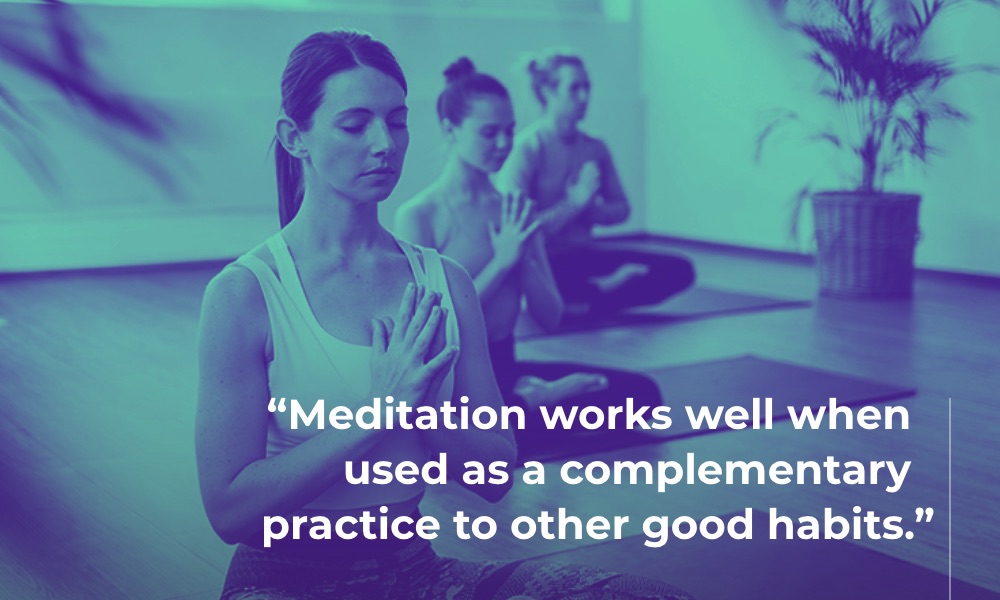Anxiety can be a pesky voice in your head that makes your day less enjoyable.
At its worst, anxiety can even be crippling. It can fill you with negative emotions and prevent you from engaging in life to the fullest. Anxiety has many causes and many solutions.
One of the most effective natural solutions for loosening its vice-like grip is meditation. So let’s explore meditation for anxiety, stress, and worry.
But first, if you’re looking for a guided meditation for anxiety…
Daily Guided Meditation for Anxiety and Worry
Will Meditation Actually Help With Your Anxiety?
Yes, meditation will actually help with your anxiety, regardless of its source. For example, those whose anxiety results from chronic pain can expect to see a reduction in symptoms of both anxiety and depression when practicing regular mindfulness meditation. If your anxiety comes from work, mindfulness meditation is proven to help with that, too. No matter what the cause of your anxious feelings, research strongly suggests that mindfulness and meditation can help.
What If You Have An Anxiety Disorder?
Meditation can absolutely benefit you if you have an anxiety disorder. In fact, one meta-analysis on the effects of transcendental meditation found that it was most effective on people with chronic anxiety and post-traumatic stress disorder. Another study found that just two months of mindfulness meditation can reduce the symptoms of generalized anxiety disorder.
How Does Meditation Help In Reducing Anxiety, Stress, and Worry?
Meditation helps with stress relief and reduces anxiety by teaching you to observe your thoughts rather than embody them. In other words, meditation helps you to notice that an anxious or stressful thought is just that–a thought. It’s not necessarily reality, and you don’t have to listen to or act upon that thought if it’s not helpful to you. It takes time and practice to learn how to distance yourself from your thoughts, but that’s what meditation is for. In time, you’ll find that you have a greater sense of peace and well-being when you practice meditation every day.
Can Meditation Cure Anxiety?
Technically speaking, there is no cure for anxiety. However, this shouldn’t cause you to despair. You may not realize that many of the health conditions we face today, like the common cold, also don’t have a “cure.” However, just like you can manage the symptoms of a cold, you can also manage the symptoms of anxiety so that it has a smaller impact on your life. And the best way to do that is with a regular meditation practice.
9 Benefits of Meditation For Anxiety
Meditation works to reduce anxiety in a few different ways:
- Meditation helps you separate yourself from your thoughts. With time, your meditation practice will help you recognize that you are not your anxious thoughts, and you don’t have to heed them.
- Meditation helps to reduce the physical symptoms of anxiety. Unfortunately, anxiety can pull you into a repetitive cycle: you feel anxious emotions, and as a result, you have physical symptoms such as a tense body or high blood pressure. These symptoms in turn can cause more anxious feelings. Mindfulness and meditation can help to disrupt this loop by reducing both the physical and mental symptoms of anxiety, giving you a chance to break the cycle.
- Meditation can help you figure out what’s actually bothering you. In some cases, anxiety is a mental health condition that doesn’t have a specific “source.” In other words, you don’t need to be worried about something specific in order to feel anxiety. Other times, however, your anxiety can have a specific source–though it may be hard to identify it. Most of us lead busy, fast-paced lives, which don’t leave much time for reflection. Meditation invites us to slow down and sit with our feelings, which can help us identify what it is that’s really bothering us.
Meditation can also improve your health and wellness by:
- Reducing the physical symptoms of anxiety, such as increased heart rate, heart palpitations, and headaches
- Helping you fall asleep (and stay asleep)
- Decreasing blood pressure
- Cultivating more self-awareness
- Helping you focus better
- Generating a greater sense of well-being and inner peace
How To Meditate To Relieve Anxiety
Nearly all meditation techniques will relieve stress and anxiety, but we recommend one of these to start:
Mindfulness Meditation
To do a mindfulness meditation session, begin by drawing your awareness to your breath. Follow each inhale and each exhale. When thoughts and feelings arise, notice them without judgment. Then, return to the breath.
Movement Meditation
You do movement meditations—you guessed it—while you’re moving. You can do a movement meditation while practicing yoga, tai chi, or even while going for a walk. Direct your attention to the physical sensations of your movement. Then, allow any thoughts or feelings to arise and fall away without judgment.
Guided Meditation
A guided meditation app, like Primed Mind, can lead you through meditations, and visualizations. This is a great option for anyone who feels intimidated by sitting alone with their thoughts. It’s also perfect for anyone who likes reminders to return to their breath.
Mantra Meditation
During mantra meditations, you mentally repeat a predetermined phrase. When thoughts and feelings arise, just note them and return to your mantra.
Body Scan Meditation
To do a body scan meditation, direct your attention to either the top of your head or the bottom of your feet. From there, bring gentle awareness to each body part, slowly moving in succession. You can try relaxing each body part as you come to it. But don’t resist any sensations you notice, such as tingling or pain. Simply note them without judgment, then move on.
How to Practice Meditation for Anxiety
Now that you know the different meditation techniques, it’s time to practice! You can do meditation for anxiety at any time of day. It takes just a few minutes to do, and it helps you gain a greater sense of peace. Follow these simple steps to begin meditating for anxiety:
- Find a comfortable location to meditate. You can try an unused corner of your bedroom or office.
- Limit distractions by shutting off electronic devices. Ask anyone who may be near you not to disturb you.
- Decide the type of meditation and the length of the session before you begin.
- Meditate for the predetermined length of time, and just be.
- It’s also a good idea to wear something comfortable while meditating. But if you’re wearing something less-than-ideal, don’t let that stop you!
Mindfulness for Anxiety
Many meditation practices also include an element of mindfulness. Mindfulness occurs when you direct all your attention to the present moment. With a mindfulness practice, you’re able to notice thoughts and feelings that arise without judgment.
Mindfulness can combat anxiety by helping you:
- Become more aware of (and change) your negative thinking patterns. You can’t change your thoughts if you’re not aware of them. (And you may be surprised at how many catastrophic thoughts fly under your radar.) Once you start observing your negative thought patterns, you’ll feel more able to let them go.
- Learn to sit with your anxious thoughts without reacting to them. Part of meditation is learning that thoughts are just thoughts. You don’t need to do anything with them. You can just let them be. Cultivating this awareness will bring you a greater sense of inner peace.
- Place emotional distance between you and your anxious thoughts. When you meditate, you learn to sit back and “watch” your thoughts and feelings happen. This lessens any desires to identify with them. Instead of believing that you’re an “anxious person,” you realize that you just have anxious thoughts.
- Explore what’s causing your anxiety without judgment. Although it’s never helpful to do so, it can be hard not to judge your thoughts and behaviors. Over time, meditation helps you develop a sense of compassion for yourself. This allows you to explore the sources of your anxiety without any mental bullying.
More Ways to Reduce Anxiety
Meditation works well when used as a complementary practice to other good habits, such as:
- Practicing mindful awareness throughout your day (not just when you’re meditating)
- Taking long, slow breaths
- Avoiding overbooking your schedule
- Eating nourishing, balanced meals
- Limiting alcohol and caffeine
- Getting regular exercise
- Getting seven to nine hours of sleep each night
- Scheduling regular time for activities you enjoy
You can also try positive affirmations or breathing exercises for stress relief when anxious feelings arise.
Always speak with a healthcare professional if you’re struggling with anxiety. A doctor may recommend therapy, medication, or other methods to help you feel better.
Let Meditation for Anxiety Help You
Anxiety can wreak havoc on your physical health and mental health. It impacts every aspect of your life, from your job to your relationships. Luckily, meditation can reduce the symptoms of anxiety and help you reclaim peace.
The Primed Mind app offers a wide range of guided meditation, visualization, and hypnosis audios that guide you into a state of deep relaxation and calm. It also offers audios to help you get better sleep, feel more confident, and build a strong mindset, all which can help manage your anxiety. Download Primed Mind today and try our daily meditations for free for 7 days.



